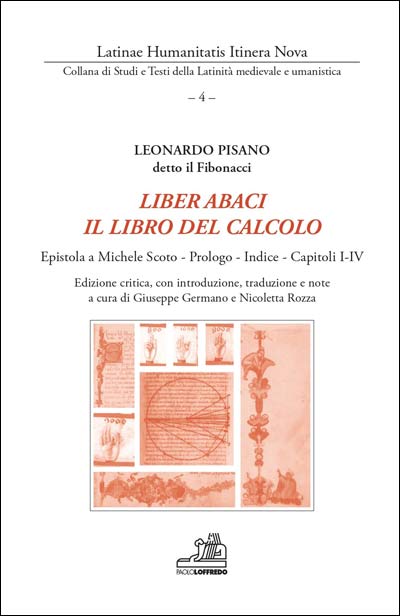Liber Abaci. Il libro del calcolo
ISSN 2611 - 2795
Language: Latin, Italian
Publisher: Paolo Loffredo Editore Srl

Description
Book Preview
Review by Bollettino di studi Latini
Review by Medioevo latino
Review by Buchbesprechungen – Comptes rendus (32 - 33)
Liber Abaci. Il libro del calcolo
Leonardo Pisano’s, also known as Fibonacci, Liber abaci has a fundamental role in the history of occidental mathematics. He was indeed capable of comparing two different cultural worlds: the Arabic and the Latin one. Moreover, thanks to his consistency, he built a compendium about all of the previous knowledges. He contributed so to the development of mathematical thinking, linking Euclide’s thoughts to Leonardo’s ones. Anyway, the Liber abaci still hadn’t got an adequate editorial cure, until the publication of this volume. It includes the first four chapters of the work, and the following ones will soon be published.
Authors
Giuseppe Germano is ordnay Professor of Medieval and Humanistic Latin Literature at the University of Naples Federico II, where he holds prestigious institutional positions, is responsible for international cooperation agreements and has directed numerous congresses and seminars of international scope and of an interdisciplinary nature. As the critical editor and exegete of medieval and humanistic texts, he conducts his philological-literary investigations around multiple focuses of interest, among which the technical literatures between the Middle Ages and the Renaissance and on the literary civilization of Humanism in Naples between 400 and '500.
Nicoletta Rozza holds a PhD in classical, Christian and medieval humanistic, Greek and Latin Philology at the University of Naples Federico I. She discussed in 2016 a thesis on Leonardo Pisano's Geometry Practice. At the same university, from 2017 to today, she received a postdoctoral research grant for the study of the Liber abaci by Fibonacci; but she also cultivated the interest in the literary culture of Humanism in Naples between 400 and 500. Moreover, she recently won a scholarship for a research stay at the Royal Numismatic Society in London.



